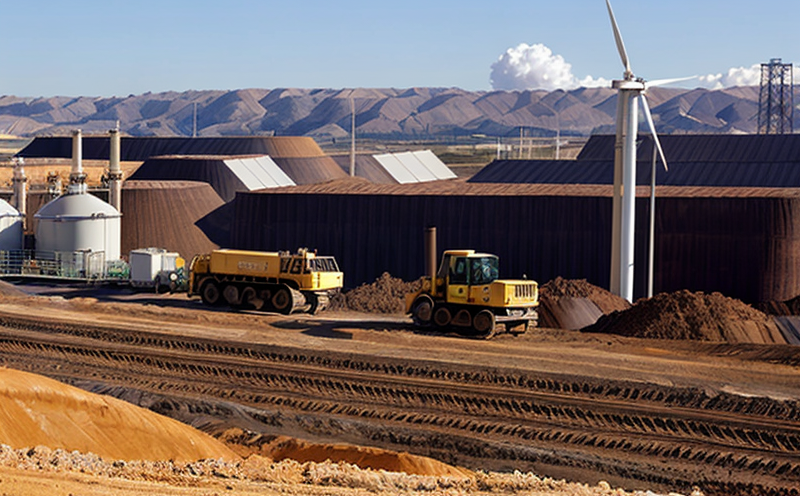ASTM D5373 Carbon Hydrogen Nitrogen Analysis of Fuels Testing
The ASTM D5373 test method is an essential standard for the quantitative determination of carbon (C), hydrogen (H), and nitrogen (N) content in fuels. This testing service supports quality control, research and development activities, and compliance with international standards within the mining sector.
The procedure involves combusting a sample under controlled conditions to measure the gases produced by combustion. These gases are then measured using infrared analysis for carbon dioxide (CO2) and methane (CH4), chemiluminescence for nitrogen oxides, and thermal conductivity for hydrogen. The results provide valuable insights into fuel composition, which is critical for optimizing processes in mining.
The ASTM D5373 test plays a crucial role in ensuring that fuels meet the required specifications set by global standards such as ISO 15226-1:2018 and EN ISO 15226-1:2019. Accurate fuel composition is paramount for efficient combustion, which directly impacts energy efficiency in mining processes.
The testing procedure involves several key steps:
- Sample preparation to ensure homogeneity and representativeness.
- Digestion of the sample under controlled conditions to ensure complete combustion.
- Analysis using infrared for carbon and methane, chemiluminescence for nitrogen oxides, and thermal conductivity for hydrogen.
The results are reported as percentages by mass of C, H, and N in the fuel. These data help mining companies make informed decisions about fuel selection and usage, thereby enhancing resource efficiency.
Industry Applications:
| Application | Description |
|---|---|
| Fuel Quality Control | Detect variations in fuel composition to ensure consistent performance and compliance with standards. |
| Process Optimization | Identify the most efficient fuel types for specific mining processes, reducing operational costs and environmental impact. |
| Emissions Monitoring | Track emissions of CO2, CH4, and NOx to comply with environmental regulations. |
The test is particularly useful in sectors where energy efficiency and cost-effectiveness are critical, such as mining. By understanding the exact composition of fuels used, mining companies can optimize their processes for maximum efficiency.
Our laboratory adheres to strict quality control measures, ensuring accurate and reliable results. Our experienced staff use state-of-the-art equipment to perform these tests, guaranteeing precision and repeatability in every measurement.
Why It Matters
The ASTM D5373 test is vital for the mining industry because it provides critical data on fuel composition. Accurate knowledge of carbon, hydrogen, and nitrogen content allows mining companies to:
- Select fuels that meet strict quality standards.
- Optimize combustion processes for energy efficiency.
- Minimize emissions and comply with environmental regulations.
Fuel selection directly influences the overall cost-effectiveness of mining operations. By choosing the right fuel, companies can reduce operational costs while enhancing resource efficiency. This is particularly important in a sector where energy consumption plays a significant role in production processes.
Moreover, compliance with international standards such as ISO 15226-1:2018 and EN ISO 15226-1:2019 ensures that mining companies are meeting global best practices for fuel analysis. This not only enhances their reputation but also helps in securing long-term contracts and investments.
By leveraging the results from ASTM D5373 testing, mining operations can significantly improve their sustainability efforts while maintaining operational excellence.
Industry Applications
- Fuel Quality Control: Detect variations in fuel composition to ensure consistent performance and compliance with standards.
- Process Optimization: Identify the most efficient fuel types for specific mining processes, reducing operational costs and environmental impact.
- Emissions Monitoring: Track emissions of CO2, CH4, and NOx to comply with environmental regulations.
The ASTM D5373 test is particularly beneficial in optimizing fuel usage, which is essential for improving energy efficiency in mining processes. By understanding the exact composition of fuels used, mining companies can make informed decisions about fuel selection and usage.
| Application | Description |
|---|---|
| Fuel Quality Control | Detect variations in fuel composition to ensure consistent performance and compliance with standards. |
| Process Optimization | Identify the most efficient fuel types for specific mining processes, reducing operational costs and environmental impact. |
| Emissions Monitoring | Track emissions of CO2, CH4, and NOx to comply with environmental regulations. |
Our laboratory plays a pivotal role in supporting mining companies by providing accurate and reliable fuel analysis. By adhering to strict quality control measures, we ensure that every test is performed with precision and repeatability.
Eurolab Advantages
Eurofins Eurolab offers unparalleled expertise in ASTM D5373 testing for fuels. Our advantages include:
- State-of-the-art equipment and facilities, ensuring precision and reliability.
- A team of experienced scientists with deep knowledge of fuel analysis and mining processes.
- Compliance with international standards such as ISO 15226-1:2018 and EN ISO 15226-1:2019.
We provide accurate, timely results that help mining companies make informed decisions about fuel selection and usage. Our commitment to quality ensures that every test is performed with the highest standards of accuracy and precision.





